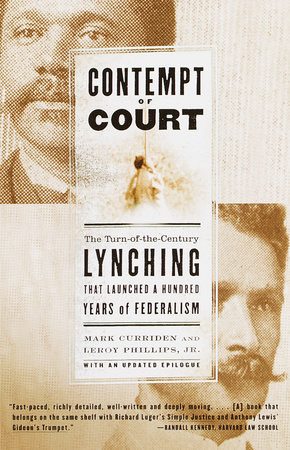Winner of the American Bar Association Silver Gavel Award
In 1906, Ed Johnson was the innocnet black man found guilty of the brutal rape of Nevada Taylor, a white woman, and sentenced to die in Chattanooga, Tennessee. Two black lawyers, not even part of the original defense, appealed to the Supreme Court for a stay of execution, and the stay, incredibly, was granted. Frenzied with rage at the deision, locals responded by lynching Johnson, and what ensued was a breathtaking whirlwind of groundbreaking legal action whose import, Thurgood Marshall would claim, “has never been fully explained.” Provocative, thorough, and gripping, Contempt of Court is a long-overdue look at events that clearly depict the peculiar and tenuous relationship between justice and the law.
“Contempt of Court should join the handful of books such as Anthony Lewis’ Gideon’s Trumpet as required reading for anyone who wants to understand how the Constitution protects individual citizens.”–Milwaukee Journal Sentinel
“[W]hat really shines through is the narrative itself—the human stories of an innocent, doomed prisoner, a community clinging to the Old South, and the men of the Supreme Court who were forced to exert their power in order to keep it.” —Oxford American
“A story of bravery, cowardice, good and evil . . . well-researched and compellingly written.” —New York Law Journal
“Mr. Curriden and Mr. Phillips capture the sights, sounds, attitudes and beliefs of Chattanooga at the turn of the century. They have woven that detail with a tragic story line to create an important book that is also a compelling read.” —Chattanooga Free Press
“[D]isturbing and heartening.” —ABA Journal
“What a story—literary gold buried in dusty old law books.” —Morris Dees, founder of The Southern Poverty Law Center
“A riveting plain-speaking book about a case that never should have been. What happened will shock you.” —Greta Van Sustern, cohost of CNN’s Burden of Proof
“An incredible story so improbable that it seems at times as if it had all been concocted by the authors.” —Washington City Paper



